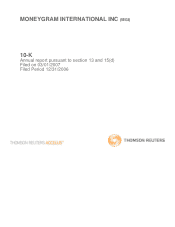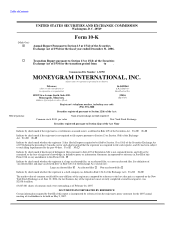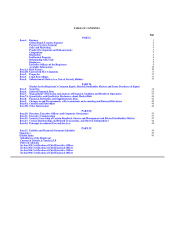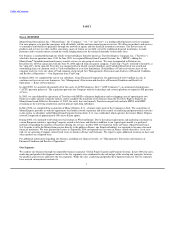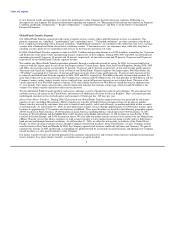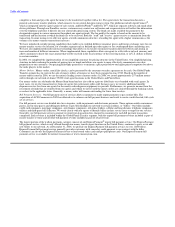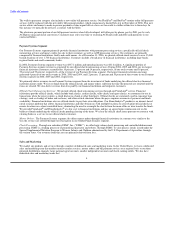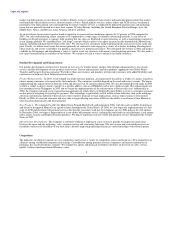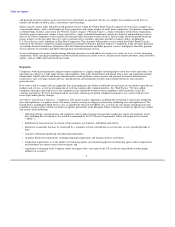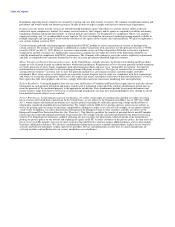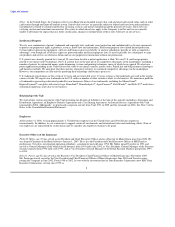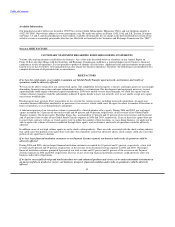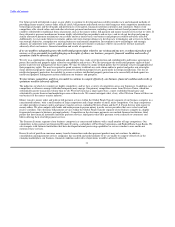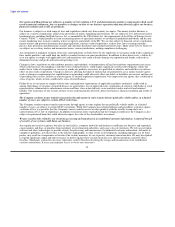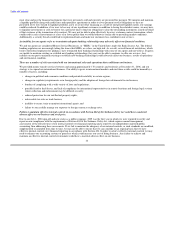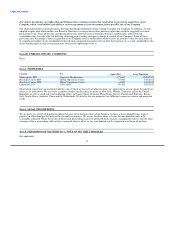MoneyGram 2006 Annual Report Download - page 10
Download and view the complete annual report
Please find page 10 of the 2006 MoneyGram annual report below. You can navigate through the pages in the report by either clicking on the pages listed below, or by using the keyword search tool below to find specific information within the annual report.
Table of Contents
Regulations impacting money transfers are constantly evolving and vary from country to country. We continue to implement policies and
procedures and work to make our business practices flexible in order to help us comply with the most current legal requirements.
In most cases, our money transfer services are offered through third party agents with whom we contract and our ability to directly
control our agent compliance is limited. As a money services business, the Company and its agents are required to establish anti-money
laundering compliance programs that include: (i) internal policies and controls; (ii) designation of a compliance officer; (iii) ongoing
employee training; and, (iv) an independent review function. We have developed an anti-money laundering training manual available in
multiple languages and a program to assist with the education of our agents on the various rules and regulations. We plan to implement a
new on-line training system in 2007.
Certain economic and trade sanctions programs administered by OFAC prohibit or restrict transactions to or from, or dealings with,
certain countries. For instance, the Company is authorized to conduct transactions with consumers in Cuba pursuant to license C-49656
issued by OFAC on July 19, 1999. However, we chose to discontinue service in Cuba in September 2006 due to excessive regulatory
requirements and low consumer use. Additionally, transactions in regions that are under the control of the Palestinian Authority are
carefully monitored for compliance with OFAC requirements. The Company will continue to assess the relative regulatory requirements
and risks as compared to the consumer demand for services in certain government identified high-risk countries.
Money Transfer and Payment Instrument Licensing: In the United States, virtually all states, the District of Columbia and Puerto Rico
require us to be licensed in order to conduct business within their jurisdiction. Requirements to be so licensed generally include minimum
net worth, provision of surety bonds, compliance with operational procedures and reserves or "permissible investments" that must be
maintained in an amount equivalent to all outstanding payment obligations issued by us. The types of securities that are considered
"permissible investments" vary from state to state, but generally include U.S. government securities and other highly rated debt
instruments. Most states require us to file reports on a quarterly or more frequent basis to verify our compliance with their requirements
and subject us to periodic examinations. Many states also require that money transmitters and issuers of payment instruments, as well as
their agents that offer these products and services, comply with federal and state anti-money laundering laws and regulations.
Escheat Regulation: Unclaimed property laws of every state, the District of Columbia and Puerto Rico require that we track the relevant
information on each payment instrument and money transfer and, if unclaimed at the end of the statutory abandonment period, that we
remit the proceeds of the unclaimed property to the appropriate jurisdiction. State abandonment periods for payment instruments and
money transfers range from three to seven years. Certain foreign jurisdictions also may have unclaimed property laws, though we do not
have material amounts subject to any such law.
Privacy Regulations: In the ordinary course of our business, we collect certain types of consumer data and thus are subject to certain
privacy laws in the United States and abroad. In the United States, we are subject to the Gramm-Leach-Bliley Act of 1999 (the "GLB
Act"), which requires that financial institutions have in place policies regarding the collection, processing, storage and disclosure of
information considered nonpublic personal information. We comply with the GLB Act by posting a privacy notice on our website, as
well as by posting a privacy notice on the forms completed by consumers in order to use services (for example, on our money transfer
"send" form). In addition, we collect personal data flowing from the European Union to other countries, and thus are subject to the
European Personal Data Protection Directive (the "Directive"). The Directive prohibits the transfer of personal data to non-EU member
nations that do not provide adequate protection for personal data. We comply with the safe harbor permitted by the Directive by filing
with the U.S. Department of Commerce, publicly declaring our privacy policy for information collected outside of the United States,
posting our privacy policy on our website and requiring our agents in the EU to notify customers of the privacy policy. In some cases the
privacy laws of an EU member state may be more restrictive than the Directive and may impose additional duties, and we must comply
with those additional restrictions. We also have confidentiality/information security standards and procedures in place for our business
activities and with our third-party vendors and service providers. Privacy and information security laws in various jurisdictions are
evolving regularly and conflicting laws in various jurisdictions pose challenges.
7

